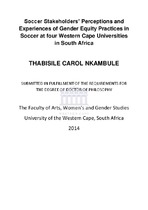Soccer stakeholders’ perceptions and experiences of gender equity practices in soccer at four Western Cape universities in South Africa
Abstract
This study presents an exploration of a group of soccer stakeholders’ perceptions and experiences of gender equity practices at four Western Cape universities in South Africa. It discusses female soccer players’ experiences of gender equity practices at universities and the implications for the structures and practices of equitable soccer organisations. The concept of soccer stakeholders in this study represents both those at leadership level, soccer administrators, and those actively participating in soccer, male and female soccer players in the universities.This study uses a feminist qualitative methodology and semi-structured individual interviews with four soccer stakeholders and 16 senior soccer players, that is, eight females and eight males, for individual interviews. In addition, focus group interviews with women only and mixed gender interviews were conducted per institution. A major finding from the study suggests the dominance of a discourse of equal and same opportunity and treatment, which was disconnected from the understandings of power, and the lack of problematising the treatment of women as ‘add-on’ to the supposedly natural and hierarchical structure of soccer. In addition, gender equity as a superficial practice and ‘favours for women’ discourses suggest the prevailing male bias in which women’s participation in soccer continues to be viewed as secondary and less valuable than men’s. Rationalising discourses for continued male dominance in soccer suggests that gender equality is ‘conditional’ for women’s teams, because the different levels of soccer they are playing at are not considered or valued the same as the men. Other key findings suggest that, firstly, the four universities did not have the gender equity policy in soccer and soccer administrators did not consider the importance of a specific and directed policy in soccer. Secondly, the results on the experiences of gender (in)equity practices in the universities corroborated the lack of support for women’s soccer and women soccer players’ experiences of marginalisation and neglect. The findings suggest that women’s soccer continues to experience inequity practices in soccer, that women’s soccer is devalued and secondary to male soccer, and that men’s soccer and men in soccer continue to be prioritised. Thirdly, the findings suggest that while the government’s sport policy is acknowledged, of concern is the lack of structures to develop soccer at grassroots level to ensure the sustainability of growth for boys’ and girls’ soccer. Furthermore, schools are identified as important institutions, particularly primary schools, to encourage and develop an interest in soccer for boys and girls, because they have paid little attention to the development of soccer for girls in different age groups, or to nurture continuity and motivation in various age groups, as compared to boys. Fourthly, there is a lack of passionate, serious, and committed people to implement and monitor the policy to make sure that the progress of gender equity practices are implemented and monitored in soccer. In addition, there is suspicion at the government’s lack of interrogating the continuing bias of the media in relation to the dominance of men’s soccer and lack of media coverage for women’s soccer. Fifth, the findings suggest that women are not playing a role in supporting their games and they need to take ownership of their soccer, because they seem to have surrendered the role of developing their soccer, and are reliant on men to develop girls’ and women’s soccer. In addition, women who play soccer reportedly experience stigmatisation through name calling and questions about their physical appearance, sexuality, and dress code. Finally, given that soccer fields are contested ‘spaces’ that have been traditionally and ‘naturally’ declared for men, research that prioritises interrogating and problematising men’s perceptions of women’s soccer and issues of gender equity practices in soccer is needed in a democratic South Africa.

